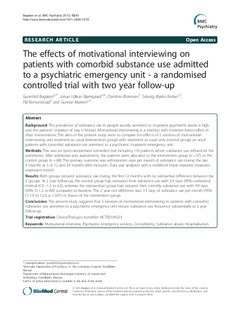| dc.contributor.author | Bagøien, Gunnhild | |
| dc.contributor.author | Bjørngaard, Johan Håkon | |
| dc.contributor.author | Østensen, Christine | |
| dc.contributor.author | Reitan, Solveig Merete Klæbo | |
| dc.contributor.author | Romundstad, Pål Richard | |
| dc.contributor.author | Morken, Gunnar | |
| dc.date.accessioned | 2015-09-11T13:17:41Z | |
| dc.date.accessioned | 2015-09-22T14:25:02Z | |
| dc.date.available | 2015-09-11T13:17:41Z | |
| dc.date.available | 2015-09-22T14:25:02Z | |
| dc.date.issued | 2013 | |
| dc.identifier.citation | BMC Psychiatry 2013, 13 | nb_NO |
| dc.identifier.issn | 1471-244X | |
| dc.identifier.uri | http://hdl.handle.net/11250/301286 | |
| dc.description.abstract | Background: The prevalence of substance use in people acutely admitted to in-patient psychiatric wards is high
and the patients` duration of stay is limited. Motivational interviewing is a method with evidence based effect in
short interventions. The aims of the present study were to compare the effects of 2 sessions of motivational
interviewing and treatment as usual (intervention group) with treatment as usual only (control group) on adult
patients with comorbid substance use admitted to a psychiatric in-patient emergency unit.
Methods: This was an open randomised controlled trial including 135 patients where substance use influenced the
admittance. After admission and assessments, the patients were allocated to the intervention group (n = 67) or the
control group (n = 68). The primary outcome was self-reported days per month of substance use during the last
3 months at 3, 6, 12 and 24 months after inclusion. Data was analysed with a multilevel linear repeated measures
regression model.
Results: Both groups reduced substance use during the first 12 months with no substantial difference between the
2 groups. At 2 year follow-up, the control group had increased their substance use with 2.4 days (95% confidence
interval (CI) –1.5 to 6.3), whereas the intervention group had reduced their monthly substance use with 4.9 days
(95% CI 1.2 to 8.6) compared to baseline. The 2 year net difference was 7.3 days of substance use per month (95%
CI 1.9 to 12.6, p < 0.01) in favour of the intervention group.
Conclusions: The present study suggests that 2 sessions of motivational interviewing to patients with comorbid
substance use admitted to a psychiatric emergency unit reduce substance use frequency substantially at 2 year
follow-up. | nb_NO |
| dc.language.iso | eng | nb_NO |
| dc.publisher | BioMed Central | nb_NO |
| dc.title | The effects of motivational interviewing on patients with comorbid substance use admitted to a psychiatric emergency unit - a randomised controlled trial with two year follow-up | nb_NO |
| dc.type | Journal article | nb_NO |
| dc.type | Peer reviewed | en_GB |
| dc.date.updated | 2015-09-11T13:17:41Z | |
| dc.source.volume | 13 | nb_NO |
| dc.source.journal | BMC Psychiatry | nb_NO |
| dc.identifier.doi | 10.1186/1471-244X-13-93 | |
| dc.identifier.cristin | 1034099 | |
| dc.description.localcode | © 2013 Bagøien et al.; licensee BioMed Central Ltd. This is an Open Access article distributed under the terms of the Creative Commons Attribution License (http://creativecommons.org/licenses/by/2.0), which permits unrestricted use, distribution, and reproduction in any medium, provided the original work is properly cited. | nb_NO |
